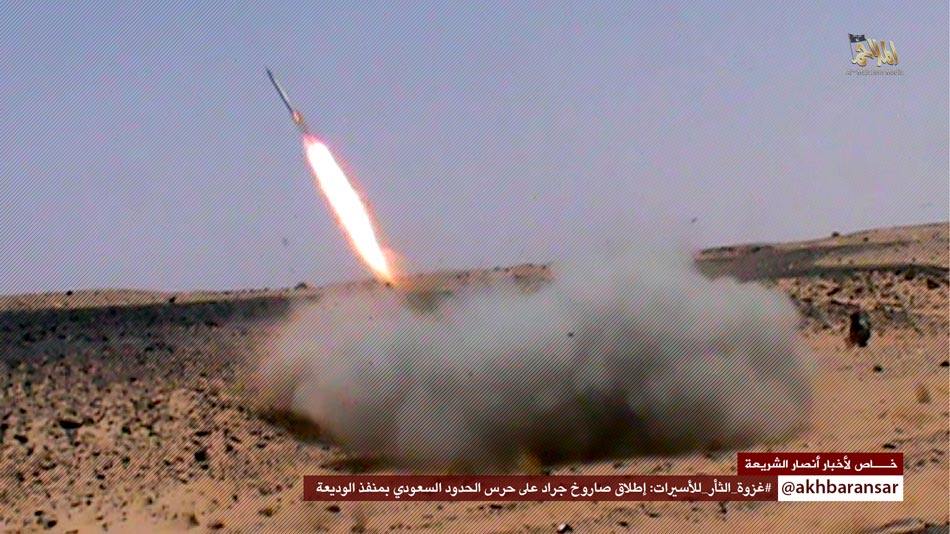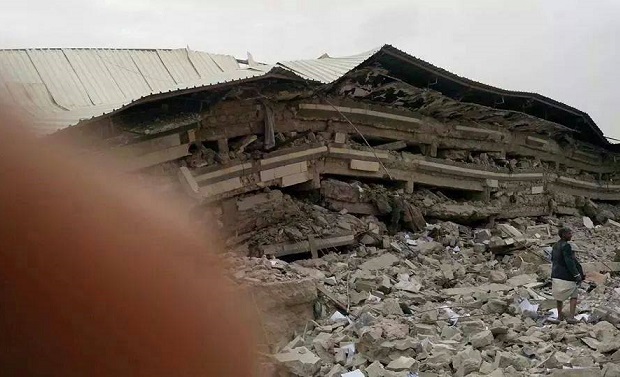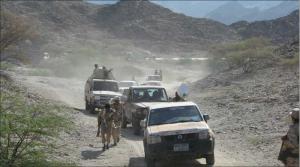www.aljazeerah.info
News, July 2014
Archives
Mission & Name
Conflict Terminology
Editorials
Gaza Holocaust
Gulf War
Isdood
Islam
News
News Photos
Opinion Editorials
US Foreign Policy (Dr. El-Najjar's Articles)
www.aljazeerah.info
|
Editorial Note: The following news reports are summaries from original sources. They may also include corrections of Arabic names and political terminology. Comments are in parentheses. |
Dozens of Yemenis Killed While Fighting Erupts in Amran, Abyan, Hadramout Between Army Forces and Huthi Fighters
July 8, 2014
 |
 |
| Huthi Yemeni militants launched a missile attack on Saudi border guards, July 2014 | Huthi Yemeni militants blew up the headquarters of the Islah Party in Amran, July 2014 |
 |
|
| Yemeni opposition fighters in Abyan, July 2014, Yemen Times |
Border crossing in Hadramout attacked by militants
Madiha Al-Junaid (author)
SANA’A, July 7, 2014 —
Unidentified militants carried out a suicide attack on July 4 at
Hadramout’s Al-Wadia border crossing linking Yemen and Saudi Arabia.
The militants detonated a car bomb and used heavy weaponry, leaving
several dead and injured.
A security operations officer in Seyoun
who spoke on condition of anonymity as he is not authorized to make
public statements, said that the attack resulted in the death of
one soldier and injury of a civilian on
the Yemeni side.
The state-run Saba News Agency reported that a
second security officer was also wounded.
The
Saudi Press Agency (SPA) reported on
its website a total of four dead security
officers including a Saudi commander on border patrol. It added
that nine security officers were injured.
“Five
of the criminals were killed and six were injured and arrested,”
the SPA claimed.
The Seyoun security source said that the
militants began their attack by firing on the border post.
“After that, a bomb-laden car entered the border post and exploded,
causing confusion among security forces,” he added.
The state-run
Saba News Agency stated that two of the attackers’ vehicles drove
towards Sharoorah governorate in Saudi Arabia following the assault.
The Wadia border crossing was reopened on July 5.
Maintaining
the security of the 1,800 kilometers long Yemeni-Saudi border has long
presented a challenge for both countries. The most prominent security
threats include human and drugs trafficking. Since 2003, Saudi Arabia
has been trying to complete a fence running along its border with Yemen
but has faced obstacles from farmers who oppose the project. They argue
that it will prevent them from accessing pastures for their livestock.
Seven soldiers killed in two attacks in Abyan, Hadramout
Yemen Times, Ali Ibrahim Al-Moshki
(author)
SANA’A, July 7, 2014 —
Seven soldiers were killed and four injured in two separate attacks
on Sunday in Abyan and Hadramout governorates in southern Yemen,
according to local military sources.
One soldier was killed and
four others injured when gunmen attacked a security compound in Hajr
district of Hadramout on Sunday, according to the state-run Saba News
Agency.
Mohammed Shamlol, a local journalist in Hadramout, said
the explosions and attacks are likely the work of Al-Qaeda in the
Arabian Peninsula (AQAP), which has been active in Hadramout recently.
Also on Sunday, in Abyan a group of soldiers ambushed a military
vehicle of the 39th Armored Division at the entrance of the Dhaiqa
valley of Al-Mahfad district, killing the six
soldiers on board, according to Fahd Ahmed, a soldier from the
Fourth Military Command in Abyan. “I cannot confirm the gunmen belong to
Al-Qaeda because the investigations are still ongoing.
The information about who did the attack is still incomplete,” said
Ahmed. He continued, “the 39th Armored Division has been in Al-Mahfad
since the beginning of the military campaign that began on April 29 in
Abyan and Shabwa, pursuing Al-Qaeda militants. The soldiers were on a
reconnaissance mission in the Dhaiqa valley.”
Al-Mahfad was one
of AQAP’s main strongholds after its militants took over Abyan in the
middle of 2011. The army expelled the militants in mid-2012.
Although the alleged AQAP militants maintain a presence in Al-Mahfad,
the Ministry of Defense said the military campaign has purged the area
of AQAP. Dozens of soldiers have been reported dead since the beginning
of the campaign. Abdu Al-Salam Al-Saribi, a former resident of Al-Mahfad
who moved to Lawder, claimed AQAP militants still live in the mountains
and valleys of Al-Mahfad.
The Yemeni government has yet to
assign blame for either of the incidents. In addition to Al-Qaeda
militants, other armed groups are active in the area, including those
linked to the Southern Movement.
On June 13, one soldier was
killed and nine others injured when a bomb-laden car exploded at a
military location at the entrance of Al-Mahfad.
Dozens killed as fierce clashes engulf Amran
Yemen Times, 8 July 2014
Amal Al-Yarisi (author)
SANA’A, July 6, 2014 –
Amran governorate witnessed a momentary cessation of hostilities on
Sunday following fierce fighting between Houthi rebels and an alliance
of the 310th Armored Brigade and Sunni tribesmen.
A
military official who spoke to the Yemen Times on condition of anonymity
said that the latest spate of violence broke out on July 4, after the
Houthis attacked a security checkpoint of the 310th Armored Brigade
located in the Al-Arbaeen area of Amran.
The official added
that this most recent violence has been the fiercest so far, reaching
strategically important locations in Amran, including hotels, a
government compound, a college and state-run factories, and leaving
dozens killed and injured.
The Yemen Times received local
reports claiming that the road to Sana'a has intermittently been closed
since July 4. Some citizens of Amran city are reportedly waiting to flee
the fighting once the road re-opens.
The commander of the Reserve
Forces, General Ali Al-Jayfi, sent five battalions to Amran to back the
310th Armored Brigade on Sunday evening, according to Hussein Barman, a
senior state official in Amran’s local government.
The
reinforcements were deployed to various military positions within Amran,
according to Barman.
In a televised speech on Thursday, Houthi
leader Abdulmalek Bader Al-Deen Al-Houthi, accused the Islah Party of
obstructing a ceasefire agreement proposed by the Defense Ministry on
June 23. He compared members of Islah with the Islamic State of Iraq and
the Levant (ISIL).
On Sunday the Islah party’s website, Islah.net,
released a statement by Saeed Shamsan, head of the Islah Political
Department, calling on the Houthis to cease fighting the government.
“The continuous bloodshed resulting from Houthis’ fight against the
soldiers, residents and state institutions of several areas in Yemen
causes the government, the Yemeni people and also the international
community to oppose them...,” he added.
Amer Al-Marani, a
negotiator for the Houthis, blamed Brigadier Hameed Al-Qushaibi,
commander of the 310th Armored Brigade, for the collapse of the latest
ceasefire agreement.
“The agreement would have succeeded if Al-Qushaibi
agreed to hand over the locations under his control,” he explained.
Since March 2014 the Houthis have demanded that the state replace
leading government officials in Amran.
President Hadi partly
conceded to the Houthis' demands by appointing Mohammed Saleh Shamlan as
as the new governor of Amran on June 8.
However, Brigadier Al-Qushaibi,
who the Houthis allege is acting in the interests of Islah, has so far
remained in power.
“The [310th Brigade] has turned into a brigade
that isn't associated with the Defense Ministry. The state should
replace the brigade’s current leadership with an independent brigadier,”
said Al-Marani.
The presidential committee that proposed the
ineffective ceasefire agreement on June 23 held an emergency meeting on
the morning of Sunday, July 6, to discuss the situation in Amran and
other fighting fronts near Sana'a, according to the state-run Saba News
Agency.
Representatives of the Houthis and the senior adviser to
the UN Special Envoy to Yemen attended the meeting, according to Saba
News.
"The committee calls on all parties to stop worsening the
security situation and to stop attacks on state institutions and
innocent residents in Amran. It deems any attack against the city and
its residents a red line that cannot be crossed,” the committee
explained.
Fair Use Notice
This site contains copyrighted material the
use of which has not always been specifically authorized by the copyright
owner. We are making such material available in our efforts to advance
understanding of environmental, political, human rights, economic,
democracy, scientific, and social justice issues, etc. We believe this
constitutes a 'fair use' of any such copyrighted material as provided for
in section 107 of the US Copyright Law. In accordance with Title 17 U.S.C.
Section 107, the material on this site is
distributed without profit to those
who have expressed a prior interest in receiving the included information
for research and educational purposes. For more information go to: http://www.law.cornell.edu/uscode/17/107.shtml.
If you wish to use copyrighted material from this site for purposes of
your own that go beyond 'fair use', you must obtain permission from the
copyright owner.
|
|
|
|
||
|
||||||


